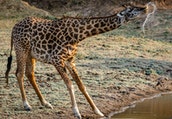- 1. Africa Ostrich Appearance:Ostriches are easily recognizable by their long necks, long legs, and large bodies. They have a distinctive plume of feathers at the end of their tails. Male ostriches have mostly black plumage with white wings and tail feathers, while females have more grayish-brown feathers.
- 2. Africa Ostrich Size: Adult male ostriches can stand up to 8 to 9 feet (2.5 to 2.7 meters) tall and weigh between 220 to 350 pounds (100 to 160 kilograms). Females are slightly smaller, with an average height of 6.6 to 7.2 feet (2 to 2.2 meters) and a weight of 150 to 260 pounds (70 to 120 kilograms).
- 3. Africa Ostrich Habitat: Ostriches inhabit a variety of open habitats, including savannas, grasslands, and semi-deserts. They are mainly found in sub-Saharan Africa, from countries like South Africa, Namibia, Botswana, and Zimbabwe to Ethiopia, Kenya, and Tanzania.
- 4. Africa Ostrich Behavior: Ostriches are diurnal, meaning they are active during the day. They are social birds and often live in loose groups, although they can also be found solitary. When threatened, ostriches can run at incredible speeds, reaching up to 43 miles per hour (70 kilometers per hour).
- 5. Africa Ostrich Diet: Ostriches are omnivores, and their diet consists of various plant materials, such as seeds, leaves, and fruits, as well as insects, small reptiles, and rodents.
- 6. Africa Ostrich Reproduction: Female ostriches lay their eggs in communal nests, and several females may contribute to the same nest. The male ostriches take turns incubating the eggs during the day, while the females take the night shift.
- 7. Africa Ostrich Conservation Status: Ostriches are listed as a species of "Least Concern" by the International Union for Conservation of Nature (IUCN) due to their widespread distribution and stable population.
- 8. Africa Ostrich Flightlessness: Ostriches are flightless birds, but they have powerful legs that allow them to run swiftly. They use their wings mainly for balance and display during courtship rituals.
Africa Ostrich
The ostrich (Struthio camelus) is a large flightless bird native to Africa and is the world's largest living bird species.
Africa Safari Tour Book online The Okapi safari
Here is some information about the ostrich:
Africa Ostrich Safari Tour
An Africa safari ostrich tour provides a fantastic opportunity to observe these unique and impressive birds in their natural habitat. Ostriches are iconic African species, and witnessing them during a safari is a memorable experience.
By planning ahead and choosing reputable safari operators or guides, Ostriches are fascinating creatures and one of the highlights of an African safari. Their striking appearance and unique behavior, such as their powerful running ability and communal nesting habits, make them a sought-after sighting for wildlife enthusiasts. Whether you're a seasoned safari-goer or embarking on your first African adventure, observing ostriches in the wild will surely leave a lasting impression and add to the magic of your African safari experience.
Here are some key points to consider when planning an ostrich-focused safari tour:
Africa Ostrichs Safari Destinations
Safari Destinations: Ostriches are found in various savannas and grasslands across Africa. Some popular safari destinations where you may have a chance to spot ostriches include:
- South Africa: Kruger National Park, Kgalagadi Transfrontier Park, Addo Elephant National Park, and various private game reserves.
- Tanzania: Serengeti National Park, Ngorongoro Crater, Tarangire National Park, and other northern circuit parks.
- Namibia: Etosha National Park, Namib-Naukluft National Park, and private reserves.
- Kenya: Maasai Mara National Reserve, Amboseli National Park, Samburu National Reserve, and others.
Africa Ostrich Guided Game Drives
Guided Game Drives: Participate in guided game drives led by experienced safari guides. These drives offer excellent opportunities to spot ostriches and other wildlife during their most active times of the day.
Africa Ostrich Wildlife Diversity
Wildlife Diversity: While on your ostrich safari, you will likely encounter a diverse range of other African wildlife, such as lions, elephants, zebras, giraffes, and various bird species.
Africa Ostrich Responsible Tourism
Responsible Tourism: Choose safari operators who prioritize responsible and ethical wildlife viewing practices. Respect the animals' space and natural behavior, and follow park regulations to ensure their well-being and conservation.
Africa Ostrich Expert Guides
Expert Guides: Engage knowledgeable guides who are familiar with ostrich behavior and their habitats. They can enhance your safari experience by providing interesting insights into these impressive birds and the surrounding ecosystem.
Africa Ostrich Photography Opportunities
Photography Opportunities: Bring a camera with a zoom lens to capture ostrich sightings and other wildlife encounters. A pair of binoculars will also be useful for better wildlife viewing.
Africa Ostrich Cultural Experiences
Cultural Experiences: Many safari tours in Africa include interactions with local communities, providing a chance to learn about their traditions, culture, and coexistence with wildlife.








 |
|  |
|  |
|  |
| 